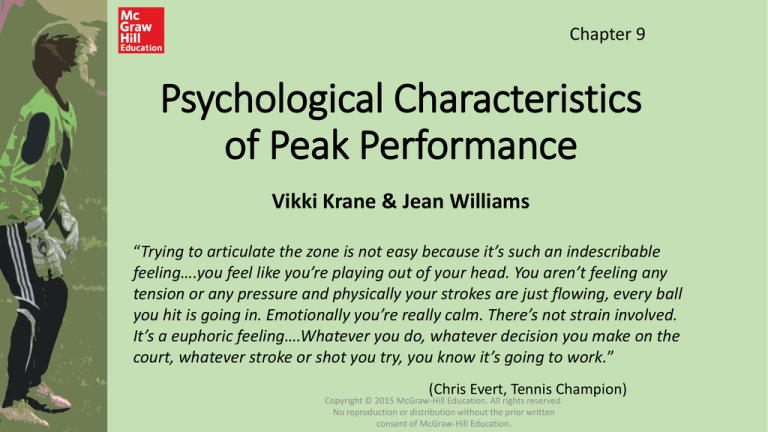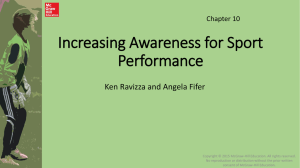
Chapter 9
Psychological Characteristics
of Peak Performance
Vikki Krane & Jean Williams
“Trying to articulate the zone is not easy because it’s such an indescribable
feeling….you feel like you’re playing out of your head. You aren’t feeling any
tension or any pressure and physically your strokes are just flowing, every ball
you hit is going in. Emotionally you’re really calm. There’s not strain involved.
It’s a euphoric feeling….Whatever you do, whatever decision you make on the
court, whatever stroke or shot you try, you know it’s going to work.”
(Chris Evert, Tennis Champion)
Copyright © 2015 McGraw-Hill Education. All rights reserved.
No reproduction or distribution without the prior written
consent of McGraw-Hill Education.
What Is Peak Performance?
• Beyond ordinary levels of play
• It all comes together – physically and mentally
• An athlete’s personal best
• It is a consequence of both physical and mental factors
• Varies from athlete to athlete
• Most likely to occur when skill level matches demands
Copyright © 2015 McGraw-Hill Education. All rights reserved. No
reproduction or distribution without the prior written consent of
McGraw-Hill Education.
How Does the Mind Work With the Body to
Produce Performance?
• 40-90% of success in sport is due to mental factors
• skill level, mental aspects
• Can train the ideal body/mind state that underlies
peak performance
Copyright © 2015 McGraw-Hill Education. All rights reserved. No
reproduction or distribution without the prior written consent of
McGraw-Hill Education.
Psychological Characteristics Associated
with Peak Performances
• Loss of fear
• Total immersion in the
activity
• Narrow focus of
attention on the present
• Feeling in complete
control
• Time/space
disorientation (usually
slowed down)
• Feeling performance was
automatic and effortless
• Control over emotion,
thoughts, and arousal
• Highly self-confident
• Physically and mentally
relaxed
• Highly energized
(Ravizza; Loehr; Garfield & Bennett; Privette & Bundrick)
Copyright © 2015 McGraw-Hill Education. All rights
reserved. No reproduction or distribution without the
prior written consent of McGraw-Hill Education.
Flow
• “The state in which people are so involved in an
activity that nothing else seems to matter.”
(Csikszentmihalyi, 1990)
• Flow may be the psychological process underlying
peak performance
Copyright © 2015 McGraw-Hill Education. All rights reserved. No
reproduction or distribution without the prior written consent of
9 Dimensions of Flow
1.
2.
3.
4.
5.
6.
Situation challenge matches skills
Awareness and action merge
Clear goals
Feedback indicating correctness
Total concentration on task at hand
Complete control without actively
attempting to be in control
7. No self-consciousness or self-evaluation
8. Time seems to speed up or slow down
9. Enjoyable -- participation its own reward
Copyright © 2015 McGraw-Hill Education. All rights reserved. No
reproduction or distribution without the prior written consent of
McGraw-Hill Education.
Factors That Affect Flow
FACILITATES FLOW
•
•
•
•
•
•
•
•
•
•
Appropriate focus
Mental and physical prep
Motivation
Arousal
Positive thoughts
Positive emotions
Confidence
Positive feedback
Good team play
Optimal environmental and
situational conditions
DISRUPTS FLOW
Opposite of what facilitates flow:
• Inappropriate focus
• Unmotivated
• Disconnected
• Negative thoughts
• Negative emotions
• Unconfident
• Negative feedback
• Poor team play
Copyright © 2015 McGraw-Hill Education. All rights reserved.
No reproduction or distribution without the prior written
consent of McGraw-Hill Education.
Effects of Flow
“Athletes who believe in their capabilities are probably
more likely to experience a balance between challenge
and skills, even when the challenge of a specific sport
competition is relatively high”
(Jackson, Kimiecik, Ford, & Marsh, 1998)
Copyright © 2015 McGraw-Hill Education. All rights reserved. No
reproduction or distribution without the prior written consent of
McGraw-Hill Education.
Mindfulness
• Nonjudgmental focus of one’s attention
on the experience that occurs in the
present moment
• This approach encourages the acceptance
of, and participation with, unwanted
thoughts
• Linked to flow
• Associated with task relevant attention,
loss of self-consciousness, and a sense of
control and peak performance
Copyright © 2015 McGraw-Hill Education. All rights reserved. No
reproduction or distribution without the prior written consent of
McGraw-Hill Education.
Individualized Zone of Optimal
Functioning (IZOF)
• Attempts to identify emotional patterns (positive
and negative) associated with individual athletes’
successful performances
• 4 groups of emotional states:
•
•
•
•
Performance-enhancing positive emotions
Performance-enhancing negative emotions
Performance-impairing positive emotions
Performance-impairing negative emotions
Copyright © 2015 McGraw-Hill Education. All rights reserved. No
reproduction or distribution without the prior written consent of
McGraw-Hill Education.
IZOF (cont.)
• Athletes assess and identify emotions related to
successful and unsuccessful performances
• Different athletes may include different emotions
• There are a range of optimal and dysfunctional
emotions
Copyright © 2015 McGraw-Hill Education. All rights reserved.
reproduction or distribution without the prior written consent
IZOF Example 1
Copyright © 2015 McGraw-Hill Education. All rights reserved.
No reproduction or distribution without the prior written
IZOF Example 2
Copyright © 2015 McGCopyright © 2015 McGraw-Hill
Education. All rights reserved. No reproduction or distribution
without the prior written consent of McGraw-Hill Education.
Extending the IZOF Approach
• Hanin includes the “metaphor selfgeneration method”
• Athletes develop a personally meaningful,
symbolic image “that allows for
understanding something unknown (or
difficult to describe)”
• Best performance metaphors were
action-oriented and symbolized
strength, power, and skill
• Worst performance images reflected
weakness and lack of readiness
Copyright © 2015 McGraw-Hill Education. All rights reserved. No
reproduction or distribution without the prior written consent of
McGraw-Hill Education.
Successful Psychological Skills in
Successful Elite Athletes
•
•
•
•
High self-confidence
Total commitment
Strong performance focus
Ability to cope well with
stress/distractions
• Good attention-focusing and
refocusing skills
• Ability to rebound from
mistakes
• Positive attitude
• High personal standards
• Well-developed
precompetition and
competitive plans
• Ability to control emotions
• A view of anxiety as
beneficial
• Use of performance goals
• Use of imagery
Copyright © 2015 McGraw-Hill Education. All rights
reserved. No reproduction or distribution without the
prior written consent of McGraw-Hill Education.
Mental Toughness
• An unshakable belief that one can achieve her or
his goals regardless of obstacles or setbacks
• Belief + focus
• FOCUS: prioritize long-term sport goal over all
other life goals
• UNFOCUS: the ability to switch off this focus to
maintain balance in their lives
Copyright © 2015 McGraw-Hill Education. All rights reserved. No
reproduction or distribution without the prior written consent of
McGraw-Hill Education.
Characteristics of Mental Toughness
• An “unshakable belief” (i.e. knowing that they can
do anything they set their minds to do)
• Stay focused
• Regulate performance (i.e. increase effort)
• Cope well with pressure
• Are aware of, and control, their thoughts and
feelings
• Control the environment (i.e. are not affected by
things out of their control).
Copyright © 2015 McGraw-Hill Education. All rights reserved. No
reproduction or distribution without the prior written consent of
McGraw-Hill Education.
The Mental Toughness Pyramid
Bull, S.J, Shambrook, C.J., James, W. & Brooks, J.E. (2005)
Copyright © 2015 McGraw-Hill Education. All rights reserv
reproduction or distribution without the prior written con
McGraw-Hill Education.
How Others* Facilitate Peak Performance
• *Teammates, coaches, family members,
and administrators
• High team cohesion
• Positive/strong team leader
• Committed coaching
• Clear coach performance plans
• Emotional and social support from
friends/family
• Team management
Copyright © 2015 McGraw-Hill Education. All rights reserved. No
reproduction or distribution without the prior written consent of
McGraw-Hill Education.
How Others Hinder Peak
Performance
• Lacking trust/confidence in teammates
• Poor coach-athlete communication
• Negative attitude toward coach
• Coach can’t deal with crises
• Unrealistic expectations from coach
• Over coaching/excessive interactions
• Coach’s inability to “keep it simple”
Copyright © 2015 McGraw-Hill Education. All rights reserved. No
reproduction or distribution without the prior written consent of
McGraw-Hill Education.
Limitations of Research Findings
• Descriptive and correlational design
• The connections are certainly relational, BUT cannot
assure a cause-and-effect relationship
Copyright © 2015 McGraw-Hill Education. All rights reserved. No
reproduction or distribution without the prior written consent of
McGraw-Hill Education.








